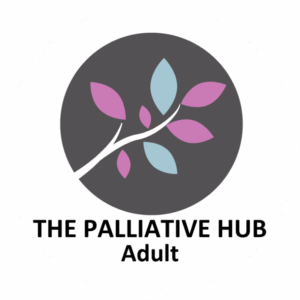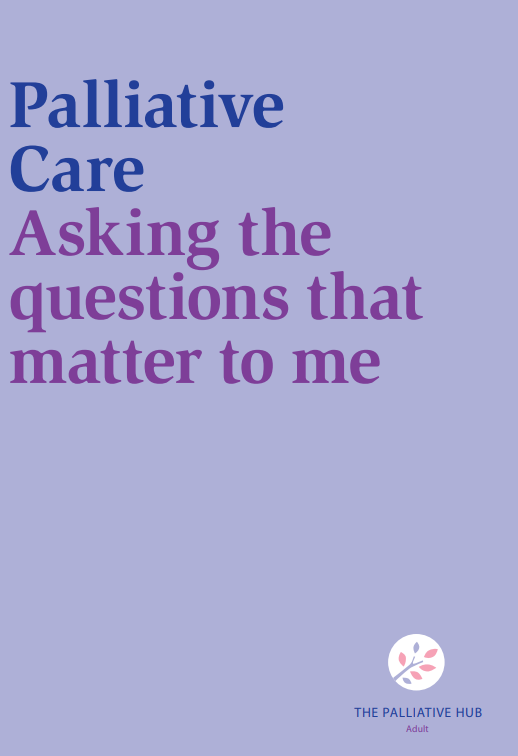
Home » Palliative Care Journey » Diagnosis and Prognosis
Getting the news that you or a loved one needs the help of a palliative care team is overwhelming and takes time for everyone involved to come to terms with. This part of the website has a number of resources and guides to help people and their families who are encountering palliative care services for the first time.
Diagnosis
Click here to view our Helpful Resources page related to Diagnosis and Prognosis
Getting the news that you or someone important to you needs the help of a palliative care team can feel overwhelming and can take time for everyone involved to come to terms with. This part of the website signposts to several resources and guides to help people and those important to them who are encountering palliative care services for the first time.
Diagnosis of a life-limiting illness means that a doctor has determined that a person has a serious health condition that will likely shorten their life. This type of illness may not have a cure or might be difficult to treat effectively. Some examples of life limiting conditions include advanced stages of cancer, heart failure, kidney or lung diseases such Chronic Obstructive Pulmonary Disease (COPD), or neurological conditions such as Motor Neurone Disease, Multiple Sclerosis and Parkinson’s Disease.
When someone is diagnosed with a life-limiting illness, doctors try to explain the situation as clearly as possible including what the illness is, how it will affect the body, what treatment options exist and how much time the person might have left. Receiving the news that you have a life-limiting illness can be devastating. You may be learning about a disease that is completely unknown to you or one where you may have known someone else with that disease in the past.
Diagnosis is a time of great change for you and those important to you. The diagnosis of a life-limiting illness can signify a point in your life where two worlds collide; the world before your illness was diagnosed and your world following your diagnosis. This diagnosis can be hard to hear but it is important for planning care, making decisions about treatment and preparing for the future.
Being diagnosed with a life-limiting illness can bring a wide range of intense emotions and feelings, which can vary greatly from person to person.
Common emotional reactions:
1. Shock and Disbelief:
The initial diagnosis often leads to a sense of shock or denial. People might have a hard time accepting the reality of the situation, especially if the illness came as a surprise or was unexpected.
2. Fear and Anxiety:
There’s often a fear surrounding the unknowns – such as the progression of the illness, pain and the eventual end of life. Anxiety about the impact on those important to you can also arise.
3. Sadness and Grief:
People may experience deep sadness, both for their own future and for the lives they may miss out on, as well as grief over the life they imagined having. This can sometimes feel like mourning for their future self.
4. Anger:
Anger can stem from the perceived unfairness of the diagnosis. Some people might feel frustrated or enraged by circumstances, especially if they feel they have no control over the situation.
5. Guilt:
Guilt might surface, especially when thinking about the impact on family and friends. Some may feel guilty about leaving loved ones behind or burdening them with the emotional or physical toll of the illness.
6. Depression:
Feelings of hopelessness or helplessness can arise as the reality of the situation sinks in. There can be a sense of loss not just of life, but of control of one’s future.
7. Acceptance:
In time some people may come to a place of acceptance, where they can begin to make peace with their diagnosis. This may involve reconciling with the reality of the situation and focussing on the quality of the time they have with those important to them.
8. Relief:
In some cases, people may experience a sense of relief if they have been struggling with prolonged pain or uncertainty. Having a diagnosis may help the person feel relief from some of the emotional and physical toll of their illness with the support from their multidisciplinary care team.
It is important to note that these emotions do not follow a linear path, people may feel them in different orders, experience some more intensely than others or fluctuate between them. Support from those important to you, therapy, and sometimes medication can help people to navigate these difficult emotions.
How you and those important to you deal with this news is completely unique to you. It is important that whoever is giving you this news takes time to ensure that you and those important to you understand what your illness means and its impact on the future. When faced with a life-limiting illness, writing things down and asking questions can help with processing the overwhelming information and emotions. These actions also provide a way to maintain clarity and control in an otherwise uncertain situation.
Suggested why writing down things might be helpful when diagnosed with a life limiting condition:
Clarify your thoughts and emotion:
The process of writing can help you articulate what you are feeling. Sometimes emotions can be hard to express verbally and writing them down gives you a space to reflect and release some of that emotional weight.
Track important information:
A life-limiting illness often comes with a lot of medical details that can be hard to absorb in one sitting. Writing down key information such as type of illness, prognosis, treatment options, or symptoms may help you to organise and retain important facts.
Record questions and concerns:
It is common to forget questions in the moment, especially when you’re overwhelmed, writing them down ensures that you don’t miss the opportunity to discuss them with your multidisciplinary care team or those important to you at a later time.
Create a legacy or write letters:
Writing letters to loved ones or documenting thoughts for the future can be a meaningful way to leave behind your voice and your wishes, which may bring peace.
Reflect on what matters:
Writing can also help to prioritise what is important to you in your remaining time – whether that’s resolving unfinished business, creating meaningful experiences or making sure your affairs are in order.
Asking questions during and after your diagnosis is key to understanding your illness and making informed decisions.
Suggested questions and advice to guide conversations with health professionals:
About the diagnosis
- What exactly is the diagnosis and how advanced is it?
- What symptoms should I expect and how can I manage them?
- Are there any treatment options available and what are their benefits and/or risks?
About prognosis:
- What is my expected life expectancy with this illness and how will it progress?
- How long will I likely be able to maintain my quality of life?
- Are there any signs to watch for that might indicate the disease is progressing?
About palliative and end-of-life care:
- What options do I have for pain management and symptom relief?
- What kind of support services are available such as hospice care, community care and counselling?
- How do I make decisions about end-of-life care such as Advance Care Planning and Advanced Healthcare Directives?
Personal and emotional impact:
- How can I talk to my family and loved ones about my diagnosis?
- Are there support groups or mental health resources for people facing a life-limiting illness?
- How can I cope with feelings of fear, sadness or anger?
Practical Matters:
- How should I plan for the future in terms of legal matters (wills, power of attorney etc)?
- Should I consider making changes to my living situation, finances or healthcare proxies?
Click here to view AIIHPC’s “Asking the questions that matter to me” brochure which details a number of questions which you may find helpful.
Other tips:
Bring a support person:
Sometimes having a friend or family member with you during appointments can help with notetaking and remembering important details.
Be patient with yourself:
There is no rush to make decisions or have all the answers immediately. It is okay to take the time to reflect and ask questions when you are ready.
Follow up:
It is easy to miss details in the emotional fog of a diagnosis. Don’t hesitate to reach out to your healthcare team again if you need clarification.
By writing things down and asking questions you are giving yourself the opportunity to stay informed, process your emotions and make choices that align with your values.
Understanding what is happening and what supports are available to you will help you come to terms with the changes to your life and plan for the future.
In general, health and social care professionals are aware of the challenges (practical and emotional aspects) and pressures (financial and levels of support) that you and those important to you may face. In palliative care, the person-centred approach involves tailoring care to meet the unique needs, preferences and values of each person. Health and social care professionals working with this approach focus on the individual, ensuring that they are treated with dignity, respect and compassion. It is important that you share your concerns with your health and social care professionals so they can help you to plan your care appropriately.
Dealing with a diagnosis can also be difficult for those important to you, they may be unsure of what to say and feel uncomfortable because they do not know what to do. People will want to help you (not cause upset) but may not know how. Discussions with children about a life-limiting illness can be very difficult and there are specialist resources and organisations that can support parents, grandparents and carers to have these conversations. The resources and organisations are available in the resource section.
To view more information about support for carers see:
Northern Ireland – Marie Curie’s Carers section Carers NI
Republic of Ireland – Family Carers Ireland Care Alliance Ireland
Prognosis
The prognosis of a life-limiting illness refers to the expected course and outcome of the illness, including how long a person is expected to live, the progression of symptoms and the likely impact of the disease on their quality of life. It helps healthcare professionals make informed decisions about treatment and care, but it is never a precise prediction and can change over time.
Factors that can impact the prognosis of a life-limiting illness include:
1. Type of illness and its stage:
The specific disease and its stage of progression are the most significant factors influencing prognosis. For example, some examples of cancer are more aggressive, while others may progress more slowly. Similarly, some chronic illness like heart failure, can vary greatly in how they impact life expectancy and daily function.
2. Response to treatment:
Some people may respond well to treatments like chemotherapy, pain management or other medical interventions which can slow the disease’s progression or help manage symptoms. Other people might not respond as well, leading to a more rapid decline.
3. Age and general health:
Younger patients or those with fewer comorbid conditions (other health issues) may have a better ability to cope with illness and treatment, potentially influencing prognosis. Older individuals or those with multiple health problems may face a faster progression of the illness.
4. Symptom management and complications:
The severity and type of symptoms a person experiences, such as pain, breathing difficulties, fatigue, or nausea affect their prognosis. Effective symptom management can improve quality of life and potentially extend life. The development of complications like infections or other illnesses can shorten prognosis.
5. Emotional and psychological wellbeing:
A person’s mental and emotional state can have a big impact on their overall wellbeing. Anxiety, depression and fear can exacerbate physical symptoms and decline, while mental and emotional resilience, support and coping strategies can improve quality of life.
6. Social support systems:
Having strong social connections and support from those important to them (family, friends, caregivers etc) can positively influence a person’s quality of life and wellbeing. A supportive environment may enable better symptom management and provide emotional strength.
7. Comorbidities (other chronic conditions):
Chronic conditions like diabetes, kidney disease or respiratory problems can complicate the management of a life limiting-illness and impact prognosis. Managing these comorbidities effectively can improve overall outcomes.
8. Lifestyle factors:
Factors such as diet, exercise, smoking and alcohol consumption can influence the progression of many chronic diseases. Maintaining a healthy lifestyle, if possible, can sometimes improve prognosis or help manage symptoms.
9. Treatment decisions and goals:
In life-limiting illnesses, people and those important to them often face difficult decisions about whether to focus on curative treatments or prioritise comfort through palliative care. The focus on comfort and symptom control can improve quality of life, even if it doesn’t change the overall prognosis.
There are also some characteristics common to all life-limiting conditions which might suggest that time is short. If you wish for information regarding your prognosis, your doctor will consider these factors when estimating how much time you might have left. It is generally not possible to make a precise prediction, in terms of exact numbers of weeks, months or years. The information they give you is an estimate and should serve as a guide.
You may also wish to know how your disease might affect you in the future. This might help you to plan ahead and enable you to make choices about how and where you would like to be cared for and to discuss this with those important to you. Living with a life-limiting illness involves significant adjustments in various aspects of daily life, and learning to adapt to new limitations can be challenging. The key to managing this transition is adjusting expectations and demands while still finding ways to maintain a sense of purpose, dignity and wellbeing. Health and social care professionals may talk about ‘living with’ your illness, this is because the emphasis of your care is on living and not dying.
Every case is unique and no two cases are the same. Even if someone you know had a very short prognosis from the same life-limiting illness that you now have, you may be completely different. The overall goal is to help you and those important to you to have the physical, emotional and mental strength to ensure the best quality of life for you and those important to you.
Click on the pictures below to view videos of people experience of being diagnosed with a life-limiting illness:





